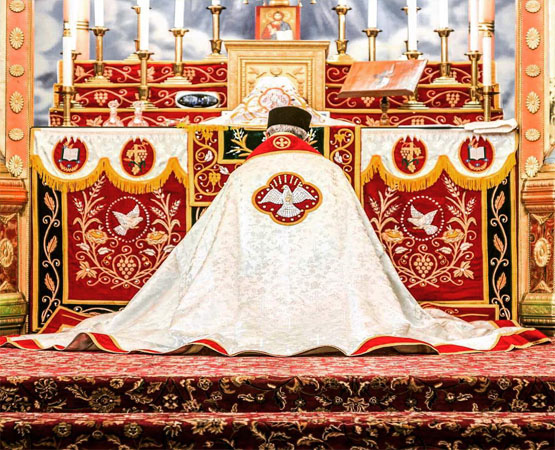About Us
The Portsmouth congregation had its humble beginning towards the end of 2009. The first spiritual gathering was a prayer meeting on Sunday 13th Dec 2009. This was followed by the first ever Holy Qurbana on Sat 13th March 2010. The Holy Qurbana was presided by Rev Fr.Mathews Kuriakose(Tiju Achan). On Sat 11th Sept 2010, H.G.Dr. Mathews Mar Thimothios Metropolitan, Diocese of UK, Europe & Africa of The Malankara Orthodox Syrian Church, proclaimed the congregation as an independent Parish. Rev. Fr. Mathews Kuriakose was appointed as the vicar of the parish by His Grace.The Church has grown, over the years, and at present there are 32 registered families. These families are from areas in and around Portsmouth and Southampton.

History
The Malankara Orthodox Syrian Church was founded by St. Thomas, one of the twelve apostles of Jesus Christ, who came to India in A.D. 52.At least from the fourth century the Indian Church entered into a close relationship with the Persian or East Syrian Church. From the Persians, the Indians inherited East Syrian language and liturgies and gradually came to be known as Syrian Christians.
In the sixteenth century, Roman Catholic missionaries came to Kerala. They tried to unite the Syrian Christians to the Roman Catholic Church and this led to a split in the community. Those who accepted Catholicism are the present Syro -Malabar Catholics. Later Western Protestant missionaries came to Kerala and worked among Syrian Christians; that also created certain splits in the community.
In the seventeenth century, the Church came to a relationship with the Antiochene Church, which again caused splits. Because of this relationship, the Church received West Syrian liturgies and practices.
The Church entered into a new phase of its history by the establishment of the Catholicate in 1912.
At present, the Church is using the West Syrian liturgy. The faith of the Church is that which was established by the three Ecumenical Councils of Nicaea (A.D. 325), Constantinople (A.D. 381) and Ephesus (A.D. 431).
The Church is in communion with the other Oriental Orthodox Churches namely, Antiochene, Alexandrian, Armenian, Eritrean and Ethiopian Orthodox Churches. The Church is in good ecumenical relationship with the Eastern Orthodox, Roman Catholic and Protestant Churches.
Malankara Orthodox Church is now administered as per the constitution adopted in 1934, which was passed by the Malankara Syrian Christian Association. The Association is a fully representative body of the Church with elected members-priests and laymen-from all the Parish Churches. Now one Priest each and laymen 1 to 10 depending on the number of members in each parish are members of the Association.
There are about 1400 parishes under the Malankara Orthodox Church. The Association elects the Catholicos, the Malankara Metropolitan, and the Bishops. There is a Managing Committee for the Association with members from each Diocese elected by the Association. The Malankara Metropolitan is the President of the Managing Committee and the remaining Prelates having administrative charge are the Vice-Presidents.
The Association Managing Committee has a Working Committee with Malankara Metropolitan as its President. The Working Committee is also the Consultative Committee of the Malankara Metropolitan. The Episcopal Synod has all the Prelates of the Malankara Church as members. Matters concerning Faith, Order and Discipline are under the authority of the Episcopal Synod. The Episcopal Synod installs the Catholicos.
At present, the Church has over 2 million faithful with 30 dioceses all over the world.